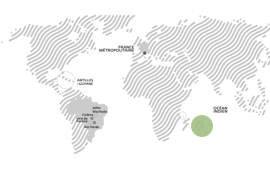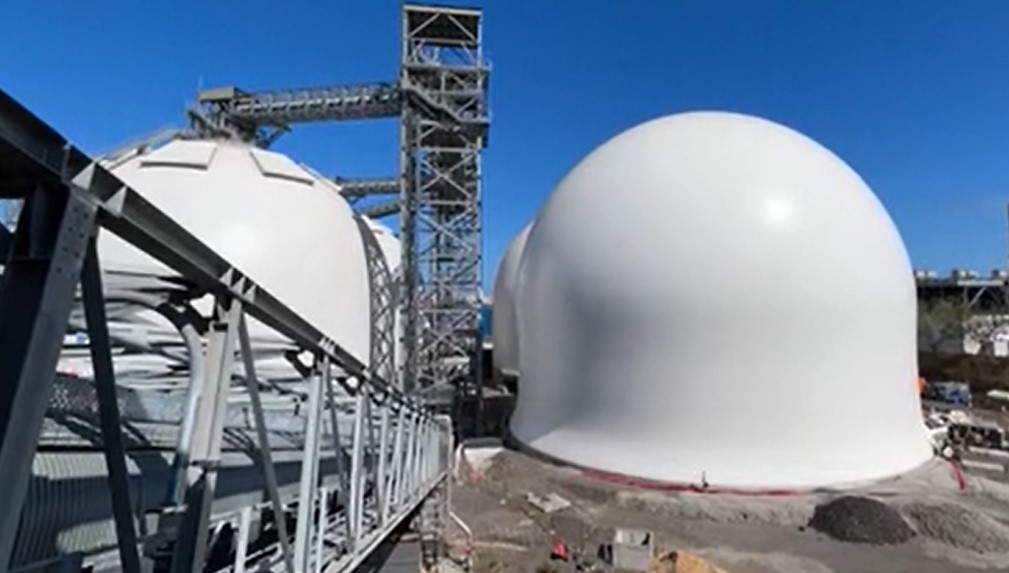
- Type: Thermal biomass power plant
- Installed since: 1992
- Installed capacity: 108 MW
- Workforce: 88
The first bagasse/coal hybrid thermal power plant in France was established by Albioma in 1992 at the Bois-Rouge site. It was then the only one installation on the island able to convert bagasse, a fibrous residue from sugar cane, into electricity to supply the Réunion power grid. In 2023, the Group announced the end of work to convert the power plant to 100% biomass.
Activities
Located in the north of Réunion Island, the Bois-Rouge cogeneration plant has an installed capacity of 108 MW, compared to 60 MW when it first opened in 1992. It is adjacent to the Bois-Rouge sugar refinery which, during the sugar harvests, feeds it with the bagasse needed for its activity.
Biomass and energy production
The Bois-Rouge plant processed bagasse and green pulp into low pressure steam and electricity. Faithful to the cogeneration principle, part of this energy return to the neighbouring sugar refinery, whilst the rest is send to the Réunion grid.
Conversion of the power plant to 100% biomass
Albioma announced on 8 December 2020 the complete discontinuation of coal at its historic Bois-Rouge plant on Reunion Island, following the deliberation by the Energy Regulatory Commission (CRE). The latter validated on 3 December 2020 the offsetting resulting from the signature of an amendment to the power purchase agreement signed by EDF for the conversion of the Albioma Bois-Rouge power generation facility to biomass.
The conversion work was completed in 2023. The plant now operates 100% on biomass, favoring available local biomass deposits.
The deliberation of the Energy Regulatory Commission (CRE) also provides for an investment envelope necessary to extend the operation of the Group’s oldest unit (ABR1) for 15 years; the electricity sale purchase contract was consequently extended from 2027 to 2043.
The conversion of the plant increased the renewable share of Reunion’s energy mix from 35% to 51%. It makes it possible to reduce greenhouse gas emissions by 84% compared to the previous operation of the plant.
4 pellet storage domes are installed at the Port of La Réunion
The last one was inflated on September 7, 2023.
A project which is part of Albioma’s plan to accelerate the energy transition of Reunion Island. Objective: store the necessary wood pellets, in addition to local bagasse, to produce renewable electricity in the Group’s 100% biomass power plants. Each dome can store nearly 30,000 tonnes of pellets.
Discover the inflation of our latest storage dome in video:

Albioma to recycle household waste to produce electricity at its Bois-Rouge power plant in the Réunion Island
Several years ago, the communities of municipalities in the north and east of the Réunion Island decided to put an end to landfilling and adopt a circular economy approach. On 16 November 2023, the French Energy Regulatory Commission (CRE) obtained the go-ahead for Albioma to convert solid recovered fuel (SRF) from Inovest’s multi-filter waste recovery centre, based in Sainte-Suzanne, into energy.
A dedicated boiler will enable almost 70,000 tonnes of this high-energy product to be recovered each year at the Bois-Rouge site.
This solution will be up and running by the end of 2026 and, in addition to providing a local resource promoting the circular economy, it will also contribute to the region’s energy self-sufficiency.
“Albioma is delighted with the CRE’s decision. As part of the multi-annual energy programme, the recovery of energy from fuels produced by sorting waste has become a necessity at a time when landfill sites in the Réunion Island are reaching saturation point. Albioma will install a boiler so that this new fuel can supply additional electricity by the end of 2026, while also providing a service to the region, promoting the circular economy and helping to increase the Réunion’ Island’s energy autonomy. The Group had been working for several years with the various stakeholders on a solution that would meet the constraints of waste reduction, local electricity production and industrial integration at the Bois-Rouge site, while complying with the most stringent environmental standards,” says Pascal Langeron, Deputy CEO of Albioma, in charge of the Indian Ocean region.

